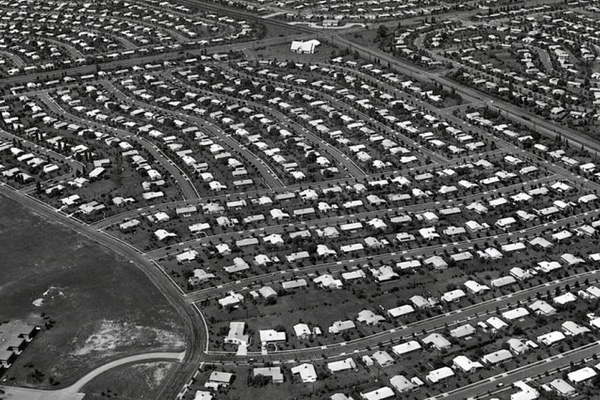Why We Need More Courses on “White Racism”

Aerial view of Levittown, 1959
Sociology makes things visible that people refuse to see. The Florida Gulf Coast University Sociology department's efforts to do this include offering a White Racism course to enable students to see white privileges and minority disadvantages that surround them. Some of these occasionally feature in the local press, which, for example, has recently highlighted how an African American community in Charleston Park has no clean water supply partly because whites voted down a scheme to build migrant labor housing in 1979. It is impossible to say how many of these whites were individually racist in their beliefs, but it is undeniable that they were acting to protect a white racial privilege, namely the high house values that are attached to properties in areas perceived to be white.
The course is also needed because white racism exists in social policy discourse. Ever since Richard Nixon's election in 1968, Republicans have campaigned to cut crime and welfare by coding both of them as "black." The current President spent several years promoting a racist smear that Barack Obama's citizenship was fraudulent. Deportation threats linger over Muslims, Haitians and Mexicans, the latter depicted as rapists. Whites benefit disproportionately from the fact that some schools are funded mainly through property taxes, which reflect advantages accrued through segregation.
White racism is absorbed at a very young age. Doll studies show preferences for white dolls, even among African American girls. White schoolchildren see their black peers being placed disproportionately into lower class streams. The black body is commodified in music and movies. If a Florida school bus drives past a prison crew being compelled to labor on community projects, the children notice that the prisoners are mostly black, but they will not yet be aware that those prisoners often got there via the racialized implementation of a bogus war on drugs, nor that the prisoners face permanent losses of voting rights as a direct result of a racist disfranchisement strategy.
Opponents of FGCU's White Racism course falsely claim that it characterizes all whites as racists, despite the professor specifically emphasizing the focus as being on systemic, structural racism. A privilege of being white is that one's advantages are invisible to oneself, and experienced as having no victims. The loss of that invisibility would be traumatic, and thus it is no surprise that courses that threaten such a loss are attacked with such vehemence.